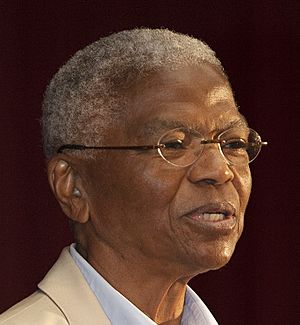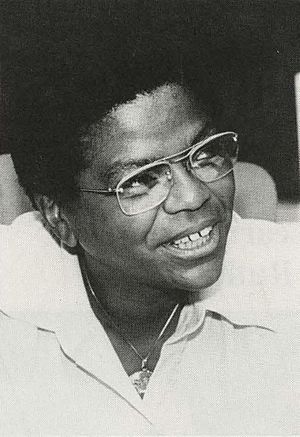Mary Frances Berry facts for kids
Quick facts for kids
Mary Frances Berry
|
|
|---|---|

Berry in 2014
|
|
| Chair of the United States Commission on Civil Rights | |
| In office 1993–2004 |
|
| President | Bill Clinton George W. Bush |
| Preceded by | Arthur Fletcher |
| Succeeded by | Gerald A. Reynolds |
| Personal details | |
| Born |
Mary Frances Berry
February 17, 1938 Nashville, Tennessee, U.S. |
| Citizenship | American |
| Parents | George Ford Frances Berry |
| Residences | Philadelphia, Pennsylvania, U.S. |
| Alma mater | Howard University University of Michigan |
Mary Frances Berry (born February 17, 1938) is an American historian, writer, lawyer, and professor. She is also a well-known activist who has worked for civil rights and social justice. Dr. Berry teaches American legal history at the University of Pennsylvania. She was also the leader of the United States Commission on Civil Rights for many years. Before that, she held important roles at the University of Maryland, College Park and was the first African American chancellor of the University of Colorado at Boulder.
Contents
Early Life and Education
Mary Frances Berry was born in Nashville, Tennessee. She was the second of three children. For a time, she and her older brother lived in an orphanage because of family difficulties.
She went to schools in Nashville that were separated by race. In 1956, she graduated with honors from Pearl High School. She then attended Fisk University and later transferred to Howard University. At Howard, she earned her Bachelor of Arts degree in 1961 and her Master of Arts degree in 1962.
Dr. Berry continued her studies at the University of Michigan. She earned her Ph.D. in American constitutional history in 1966. In 1970, she also received her law degree (J.D.) from the University of Michigan Law School.
A Career in Leadership and Civil Rights
Mary Frances Berry worked at the University of Maryland for seven years. She became the interim leader of the College of Behavioral and Social Sciences. In 1976, she made history as the first Black woman to lead a major research university when she became chancellor of the University of Colorado at Boulder.
In 1977, President Jimmy Carter asked her to serve as assistant secretary for education in the U.S. Department of Health, Education, and Welfare. She took a break from the University of Colorado to take on this important role.
After leaving the Department of Education in 1980, Dr. Berry returned to Howard University as a professor. President Carter also appointed her to the U.S. Civil Rights Commission. This commission works to protect the civil rights of all Americans. During her time on the commission, she sometimes disagreed with President Ronald Reagan's views on civil rights. She even went to court to keep her position when there was an attempt to remove her.
Fighting Apartheid in South Africa
In 1984, Dr. Berry helped start the Free South Africa Movement. This group worked to end apartheid in South Africa. Apartheid was a system of racial separation and discrimination. She was arrested at the South African Embassy in Washington, D.C., to bring attention to the cause. This action helped raise awareness about the unfair system.
In 1987, Dr. Berry became a professor at the University of Pennsylvania. She continued to serve on the Civil Rights Commission at the same time.
Leading the Civil Rights Commission
In 1993, President Bill Clinton appointed Dr. Berry as the chair of the Civil Rights Commission. She was reappointed for another term in 1999. As chair, she played a key role in guiding the commission's work.
Dr. Berry also served as chair of the Pacifica Radio Foundation's National Board from 1997 to 2000. She worked to help the radio stations reach more people and attract a wider audience.
She continued her work on the Civil Rights Commission until her term ended in late 2004. She was succeeded by Gerald A. Reynolds.
Key Roles and Contributions
Mary Frances Berry has held many important leadership positions throughout her career:
- 1974–1976: Provost at the University of Maryland College of Behavioral and Social Sciences
- 1976–1977: Chancellor of the University of Colorado at Boulder
- 1977–1980: Assistant Secretary for Education in the U.S. Department of Health and Human Services
- 1980–2004: Member, Vice-Chairman, and Chairman (1993–2004) of the U.S. Commission on Civil Rights
- 1987–present: Geraldine R. Segal Professor of American Social Thought at the University of Pennsylvania
- 1997–2000: Chairman of the Board for Pacifica Radio
- 1990–1991: President of the Organization of American Historians
- Co-Founder of the Woodhull Freedom Foundation in 2003
Awards and Honors
Dr. Mary Frances Berry has received many awards for her work:
- 1965: Civil War Roundtable Fellowship Award
- 1983: NAACP, Roy Wilkins Civil Rights Award
- 1983: NAACP, Image Award
- 1985: Southern Christian Leadership Conference, Rosa Parks Award
- 1985: Congressional Black Caucus Foundation, President's Award
- 1986: Hubert H. Humphrey Civil Rights Award
- 1986: Ms. magazine, Woman of the Year
- 1987: National Council of Negro Women, Achievement Award
- 2008: National Center for Health Research, Foremother Award
- 2014: Organization of American Historians, Roy Rosenzweig Distinguished Service Award
Selected Works
Mary Frances Berry has written several books. One of her books, published in 1993, is titled The Politics of Parenthood: Child Care, Women's Rights, and the Myth of the Good Mother. This book explores the history of the women's movement and challenges faced by women in society.


